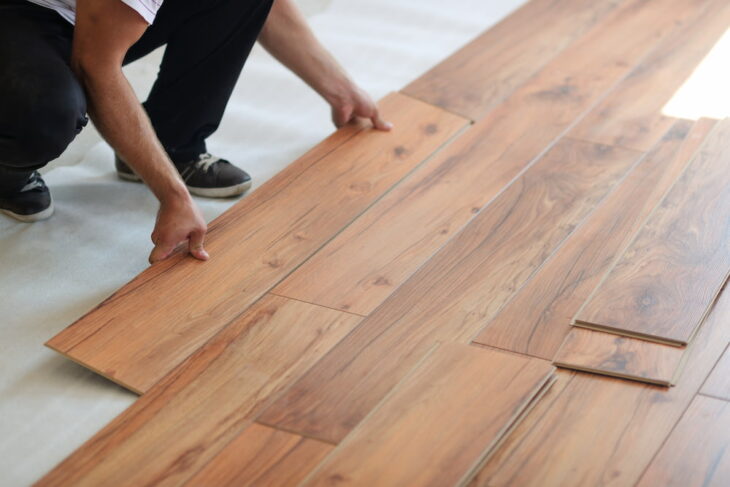Disclosure: Articles may contain affiliate links. As an Amazon Associate, we earn from qualifying purchases (at no additional cost to you). See our full disclosure here.
Last updated on June 22nd, 2023 at 01:30 pm
Are you in the market for new flooring? If so, you may be wondering what your options are. There are many different types of flooring materials available, making it difficult to decide which one is right for your home.
Most of us love the beautiful look of hardwoods, so in this article, we’ll discuss the pros and cons of upgrading to a hardwood floor. We’ll also talk about how to know whether this is the right choice for your needs, or whether another flooring type makes better sense for you.

Choosing New Flooring for Your Home? What to Consider
1. Understand the Pros and Cons of Hardwood Flooring
Hardwood floors are a popular choice for homeowners who want to upgrade their home’s interior design. They add warmth and beauty to any room, and they last longer than other types of flooring materials.
However, hardwood also comes with some drawbacks. It can be expensive to install, and it requires regular maintenance in order to keep its luster. In addition, some hardwood types aren’t suitable for certain climates or conditions. Also, hardwood floors can be scratched and dented if not cared for properly.
2. Consider Your Budget and Lifestyle
When deciding which type of flooring to buy, it’s important to consider your budget and lifestyle. If you’re looking for a material that won’t break the bank, laminate or vinyl may be good cost-effective options.
However, if you’re looking for something more durable and long-lasting, like solid hardwood flooring, then it’s also worth investing a bit more money on the floor itself and on quality installation.
It’s important to think about how much care is required for each type of flooring too. Hardwood requires more regular maintenance.

3. Consider the Style of Your Home
The style of your home should be a factor in deciding which type of flooring to buy. For example, if you have a traditional or rustic-style home, then hardwood may be more suitable than other materials such as laminate or vinyl. On the other hand, if you have a modern-style home, then laminate or vinyl might be a better choice for achieving an updated look and feel.
You’ll also want to consider the color, texture, and style of your existing furniture and décor, as this can help inform which flooring material will best complement the overall look of your space.
4. Get Expert Advice
When it comes to making a major purchase like new flooring, it’s always wise to get expert advice. Schedule an appointment with a professional contractor to discuss your needs and budget before making any decisions.
A contractor can help you determine which type of flooring is best suited for your home, as well as how much installation may cost and what kind of maintenance is required afterward.
Getting expert advice can save you time, money, and hassle in the long run. And, don’t forget to read customer reviews, and ask friends or family who have recently upgraded their flooring for advice.

5. Research Different Types of Flooring Materials
Research is key when it comes to making the right flooring choice for your unique needs. It’s important to understand the pros and cons of each type of flooring material so that you can make an informed decision.
For example, hardwood flooring is known for its elegant appearance and durability, but it requires more maintenance in order to keep its shine and to avoid damage.
Laminate or vinyl flooring may be more cost-effective options, and may require less care. The downside is they will not last as long.
Ultimately, the type of flooring you choose should depend on your budget and lifestyle needs.
6. Make Sure You Get a Good Warranty
Don’t forget to get a good warranty for your new flooring. The right warranty can ensure that you’re covered in case of any damage or defects. Look for warranties that cover installation and repair costs as well as maintenance. This can help save you money if anything goes wrong with your purchase.
Some companies also offer additional warranties an an upgrade, such as pet-proofing or waterproofing.

7. Ask Questions Before Making a Purchase
Before you make such a large purchase, be sure all of your questions are answered. In fact, make a list of questions about each flooring type you’re considering.
Ask about installation, cost, warranties, or anything else related to your purchase. This can help ensure that you get the right flooring material for your needs and budget.
It’s also important to ask questions related to the cleaning and maintenance required for each type of floor. Did you know you can actually damage some types of floors by cleaning them incorrectly?
By asking the right questions before making a purchase, you can save yourself time and money in the long run–and avoid buyer’s remorse.
8. Take Your Time, and Make the Right Choice
It’s important to take your time when it comes to buying new flooring for your home. Don’t make an impulse purchase just because there’s a sale or you see something that looks pretty in the showroom.
Consider all your options, do research, and get expert advice before making any final decisions. By taking the time to make the right choice for your specific needs, you can ensure that you get the best flooring material for your home and lifestyle.
For example, think about whether you want this to be the last new flooring purchase your make for your home. In that case, you will spend more for a longer-lasting flooring, like hardwood. Or, if you’re budget’s a little more limited, you can go for a quality vinyl or laminate to get a great look–but one that won’t necessarily last for the life of your home.
9. Consider the Future
As we just mentioned, when it comes to buying new flooring for your home, it’s important to consider the future. Will you be living in this home long-term or for just a few years? What kind of lifestyle will you have in the future and how might that affect your choice of flooring? What is your budget now and what might it be in the future? Will you be able to afford to replace the flooring again if needed down the line?
By taking the time to think about these questions now, you can make sure that you get flooring material that will look good, perform well, and work for your family.
Upgrading your house floor is a big decision that requires careful consideration. Following these tips can help you make the right buying choice for your needs and budget.
Research different types of flooring materials, get expert advice, ask questions before making a purchase, and take your time to ensure you’re making the best decision. With the right planning and preparation, you can upgrade your home’s floors with confidence.
Also read:
The Best Calming Colors to Create a Cozy Home
How to Select Lighting for Each Room of Your Home: 4 Important Tips
5 Easy Ways to Breathe Life Back into Your Bedroom (Without Breaking the Bank)
You can also find MomsWhoSave on Facebook, Instagram, Pinterest, and Twitter. Join us for updates.
Don’t miss a thing! Subscribe to MomsWhoSave’s newsletter.
Leave a Reply